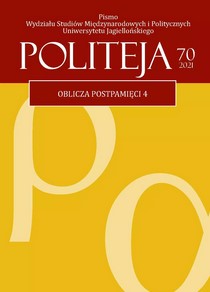PRZEKŁAD JAKO PRAKTYKA POSTPAMIĘCI I FORMA OPORU WOBEC MARGINALIZACJI. PRZYPADEK LITWINÓW NAD MORZEM ŁAPTIEWÓW DALII GRINKEVIČIŪTĖ
TRANSLATION AS A POSTMEMORIAL PRACTICE AND A FORM OF RESISTANCE AGAINST MARGINALIZATION. THE CASE OF „LITHUANIANS BY THE LAPTEV SEA” BY DALIA GRINKEVIČIŪTĖ
Author(s): Kamil PecelaSubject(s): Lithuanian Literature, Translation Studies, Theory of Literature, Politics of History/Memory
Published by: KSIĘGARNIA AKADEMICKA Sp. z o.o.
Keywords: translation; postmemory; Lithuanian literature; Dalia Grinkevičiūtė;
Summary/Abstract: In my text I focus on the problem of translation as one of the postmemorial practices and as a form of resistance. My argument is that the translation (as a process and as a text) may be seen not only as an act of resistance against totalitarian regime and occupation but also as an act of multi-faceted “ratification” of the original text. „Lithuanians by the Laptev Sea” by Dalia Grinkevičiūtė was an act of resistance. Translations reinforced this aspect of the book, becoming acts of resistance themselves. Translated text impacts not only the receiving culture (in Poland it provides new context for similar Polish documents), but also the culture that the translated text originates from. Translation “ratifies” the subject of translated book, it’s credibility, prestige and influence in original culture. Sometimes it may also lead to a new editorial and scientific approach in the original culture.
Journal: Politeja - Pismo Wydziału Studiów Międzynarodowych i Politycznych Uniwersytetu Jagiellońskiego
- Issue Year: XVIII/2021
- Issue No: 70
- Page Range: 125-134
- Page Count: 10
- Language: Polish

